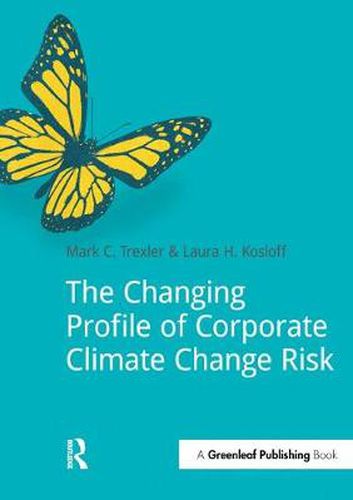Readings Newsletter
Become a Readings Member to make your shopping experience even easier.
Sign in or sign up for free!
You’re not far away from qualifying for FREE standard shipping within Australia
You’ve qualified for FREE standard shipping within Australia
The cart is loading…






This book will help business executives to (1) rethink their perceptions of climate risk (2) evaluate whether their company is effectively positioned, and (3) make informed and prudent business decisions about climate change risk in an environment rife with policy uncertainty. Business risk associated with climate change is commonly assumed to be primarily policy driven. Many companies internalize the current stalemate over global climate policy into a perception that climate risk is no longer a critical issue. Business climate risks, however, include: Operational and Supply Chain (Physical) Risk, Brand Risk, Market-driven Structural Risk, Liability Risk. As national and global policy to materially reduce climate change is delayed, it is business-prudent to assume that the level of climate risk is increasing. Even if policy risk might seem lower today than a few years ago, political will can change quickly. Should physical impacts of climate change manifest in dramatic ways, for example, draconian climate policy is likely to follow quickly. These conditions create a complex and shifting business risk environment, and most companies either overlook or substantially underestimate key climate risks. How many companies, for example, are positioned for material climate change outcomes, whether physical or regulatory? Companies with little climate change exposure may not face much downside risk from taking a wait-and-see approach. For those with greater exposure, being too late to respond will mean costs and competitive impacts that could have been avoided. Being too early, however, can mean being penalized later for actions that reduce a company’s emissions today, or competitive disadvantage from getting too far out in front of competitors.
$9.00 standard shipping within Australia
FREE standard shipping within Australia for orders over $100.00
Express & International shipping calculated at checkout
This book will help business executives to (1) rethink their perceptions of climate risk (2) evaluate whether their company is effectively positioned, and (3) make informed and prudent business decisions about climate change risk in an environment rife with policy uncertainty. Business risk associated with climate change is commonly assumed to be primarily policy driven. Many companies internalize the current stalemate over global climate policy into a perception that climate risk is no longer a critical issue. Business climate risks, however, include: Operational and Supply Chain (Physical) Risk, Brand Risk, Market-driven Structural Risk, Liability Risk. As national and global policy to materially reduce climate change is delayed, it is business-prudent to assume that the level of climate risk is increasing. Even if policy risk might seem lower today than a few years ago, political will can change quickly. Should physical impacts of climate change manifest in dramatic ways, for example, draconian climate policy is likely to follow quickly. These conditions create a complex and shifting business risk environment, and most companies either overlook or substantially underestimate key climate risks. How many companies, for example, are positioned for material climate change outcomes, whether physical or regulatory? Companies with little climate change exposure may not face much downside risk from taking a wait-and-see approach. For those with greater exposure, being too late to respond will mean costs and competitive impacts that could have been avoided. Being too early, however, can mean being penalized later for actions that reduce a company’s emissions today, or competitive disadvantage from getting too far out in front of competitors.